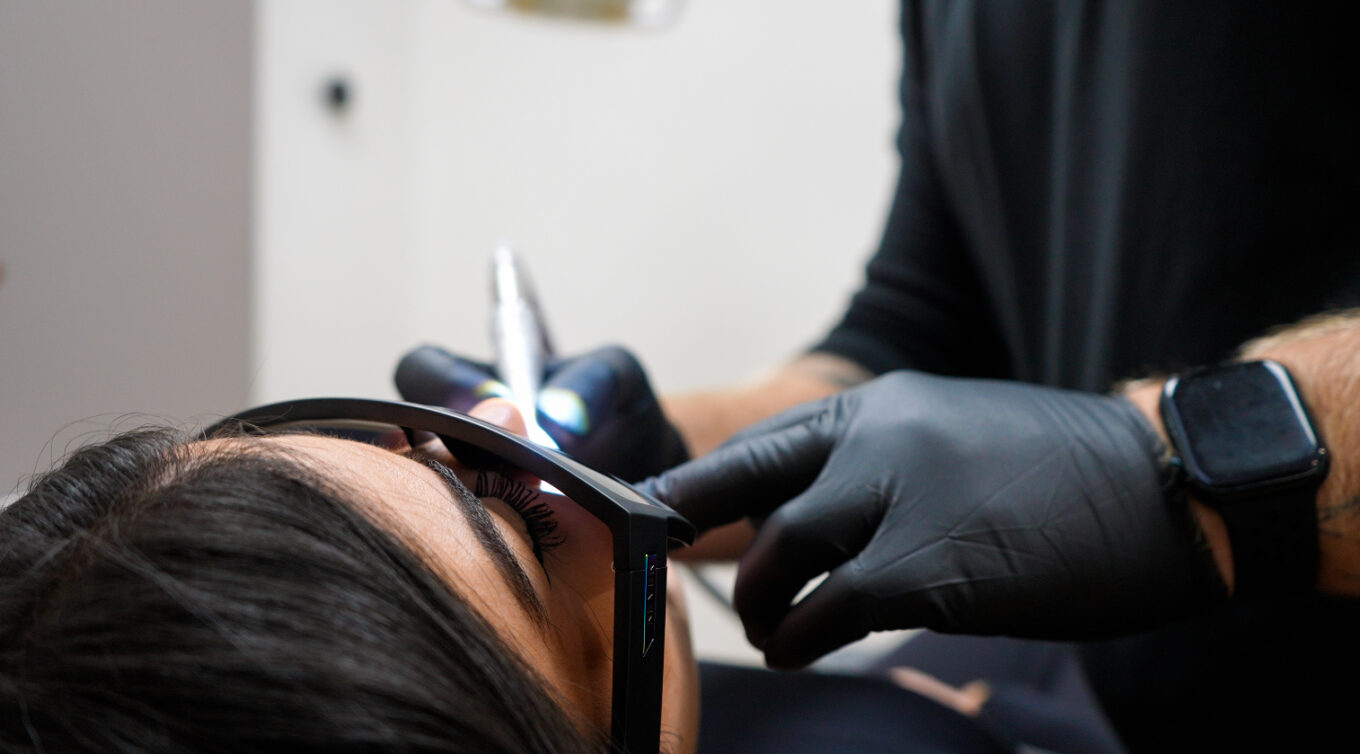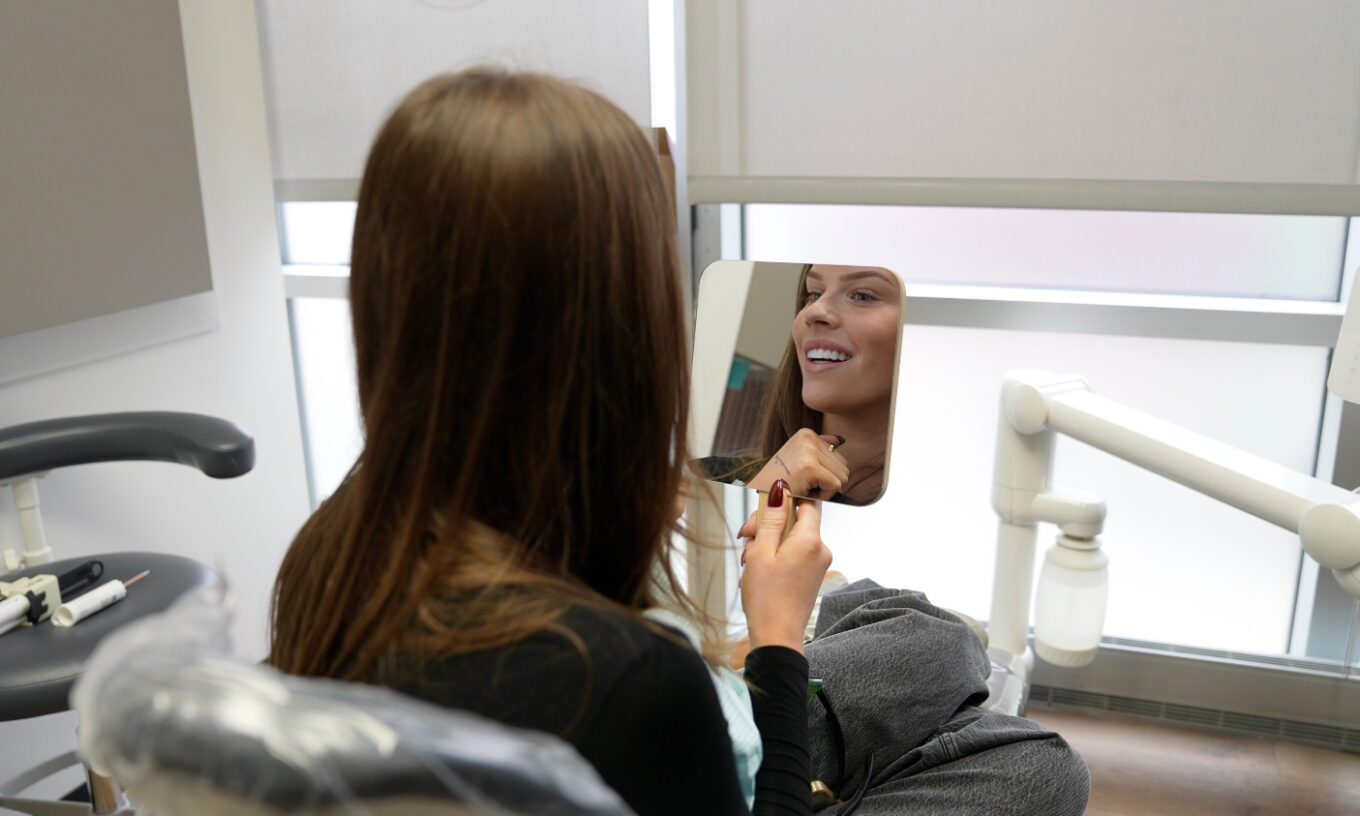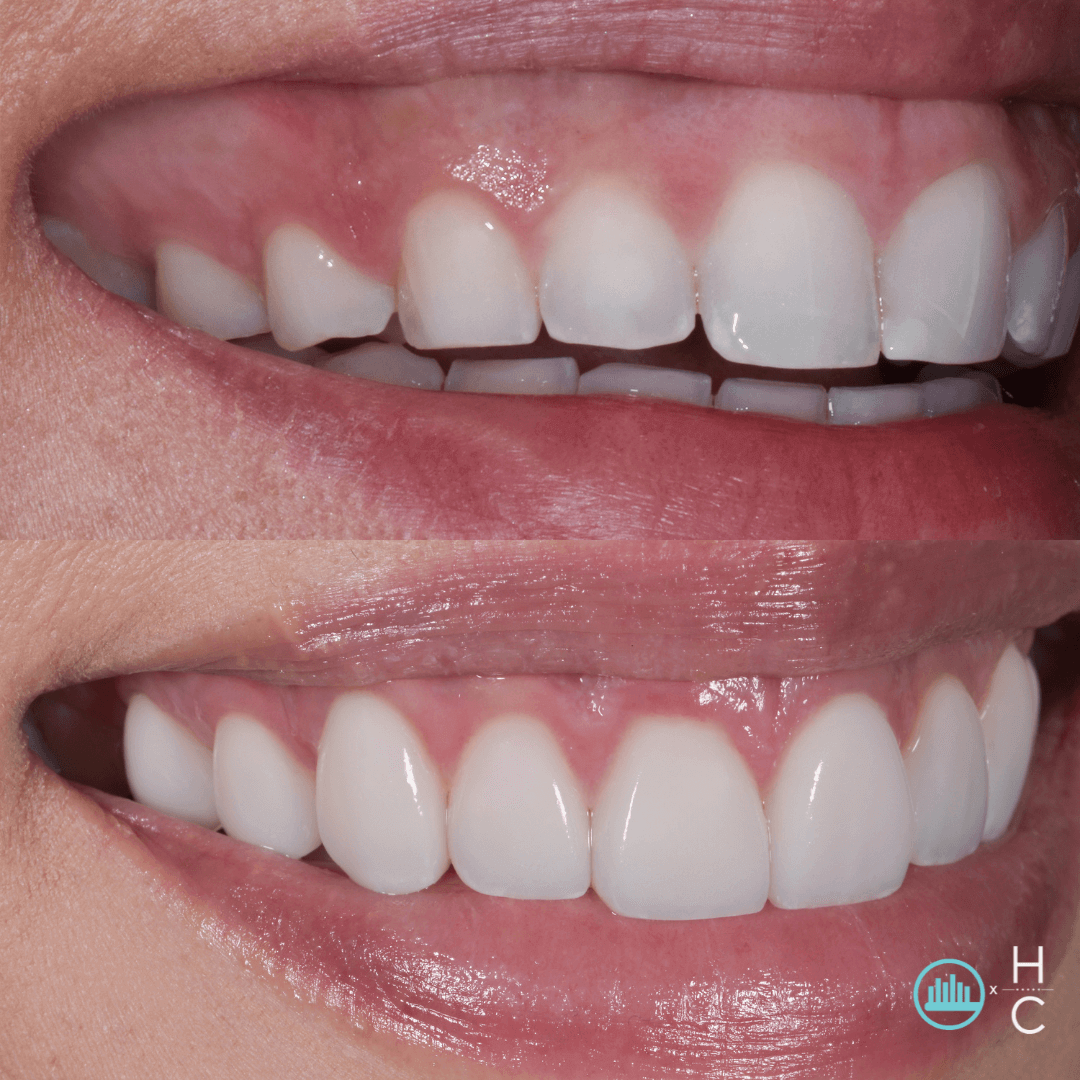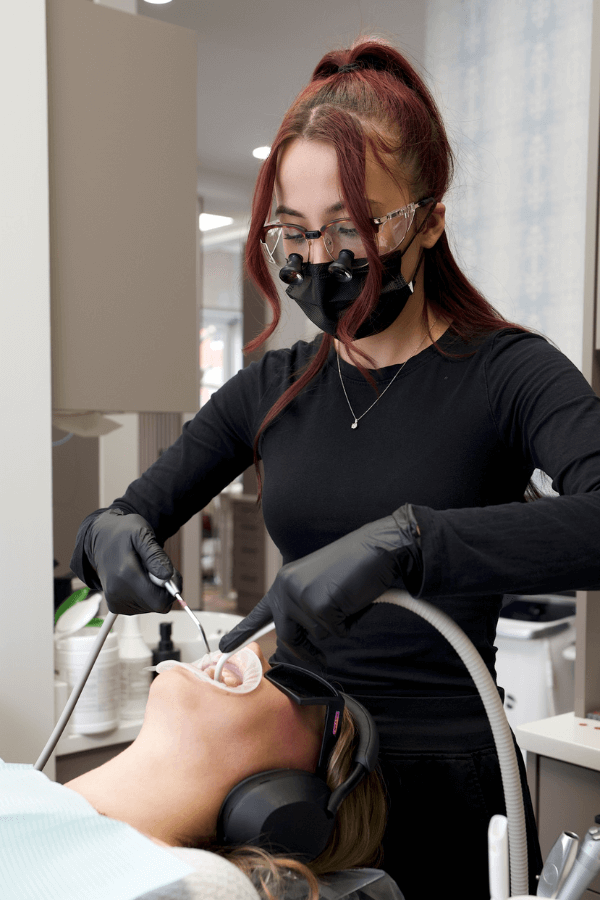Can a dead tooth be saved? What are the major causes of dead teeth? By understanding the causes and treatments for dead teeth, you can maintain your smile’s allure and keep it looking its best for years to come.
In many cases, timely action determines how long a dead tooth lasts. The chance of a favorable outcome is increased when dental care is sought as soon as discomfort or discoloration appears. Complications from a delayed reaction could require more involved treatments or tooth extraction. Additionally, neglecting the signs of dying teeth can exacerbate the situation, leading to further decay and potential tooth loss.
At The Chicago Dental Studio, our dental professionals are passionate about efficient, patient-focused dentistry. When you arrive at our studio, our priority is your dental health and comfort. We put your comfort first during every treatment. By taking a complete approach, you can be sure that your whole well-being is based on your oral health.
Continue reading to learn more about our boutique dental studio, or contact our team to schedule an appointment today. If you’re wondering, “Can a tooth die?” Rest assured that our experienced dental professionals can provide you with the information and care you need to address any concerns about dental health.
What is a Dead Tooth?
First things first, what is a dying tooth?
All teeth have three layers: enamel, dentin, and pulp (which contain blood vessels and nerves). Understanding how a tooth dies involves the deterioration or infection of the pulp, often due to untreated decay or trauma.
When a tooth dies, it no longer receives a fresh blood supply, causing it to become discolored and painful (in the tooth or gum), along with other unpleasant symptoms (further discussed below).
Because dead teeth are inconvenient, uncomfortable, and far from aesthetic, individuals who encounter this problem should seek out quality dental care as soon as possible to remedy the issue. Removing a dead tooth promptly can prevent further complications and restore oral health and confidence.
Sensitivity to heat or cold, along with gum tissue swelling or pain, are some of the signs of a dead tooth. The impacted tooth could also become discolored and appear darker than the neighboring teeth, or it may not feel hot or cold at all.
If you’re wondering, “How do you get a dead tooth?” It typically occurs when untreated decay, trauma, or infection reaches the inner pulp of the tooth and leads to its deterioration.
When it comes to dead teeth, early intervention is essential. Dentists usually use procedures like root canal therapy to treat the problem and preserve the tooth while reducing related discomfort.
Root canal therapy is often recommended for dead teeth to alleviate pain and save them from extraction. It aims to remove infected pulp and seal the root canal to prevent further decay.
Dead root tooth situations require prompt attention to prevent further complications. Dead tooth root canals before and after scenarios demonstrate the effectiveness of this treatment in restoring oral health and function. To avoid future issues, the issue could worsen if ignored and call for more intrusive treatments or tooth extraction. Getting dental care as soon as possible is crucial for a successful resolution and better oral health.
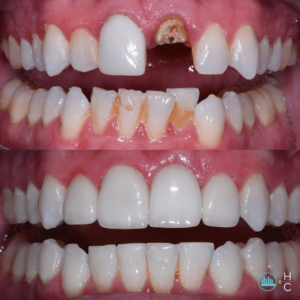
What Causes a Tooth to Die?
Now that you’re familiar with what a dead tooth is, let’s answer the question: What causes a dead tooth?
Two primary causes of dead teeth are tooth decay (rotten teeth) and tooth trauma (when physical trauma causes the blood vessels to burst or be cut off). Regardless of how the dead tooth was created, the symptoms will remain similar for either cause.
A persistent toothache, sensitivity to temperature variations, and tooth color changes are typical warning signs. When people know these factors, they can better appreciate the significance of quickly treating dental issues and preventing them from worsening.
The following section explores the primary signs and symptoms of a dead tooth in more detail, providing insight into people’s pain and difficulties in managing this oral health issue. Understanding these causes and symptoms enables people to take charge of their dental health and, when necessary, seek prompt, expert care.
7 Signs of a Dead Tooth
What are the symptoms of a dead tooth that I should be on the lookout for? If you are concerned that you may have a dead tooth, seven of the main signs of a dead tooth are:
- Tooth discoloration
- Tooth turning gray
- Tooth or gum pain
- Tooth Sensitivity
- Sensitivity to temperatures (hot or cold) or no sensation to temperature
- Bad breath
- Bad taste in your mouth
- Gum swelling
- No temperature sensation
The severity of these symptoms might vary, and they can manifest singly or in tandem. Keeping an eye out for these indicators encourages people to get expert dental treatment as soon as possible, which promotes early diagnosis and action. People can take proactive steps for their dental health by being aware of these subtle signals, which can help ensure that possible problems with a dead tooth are effectively treated before they worsen. Dead tooth before and after images often illustrate the transformative impact of timely intervention, highlighting the importance of seeking professional dental care at the earliest signs of trouble.

Treatment Options For a Dead Tooth
Understanding your options for treatment is crucial when coping with a dead tooth. There are two ways to proceed:
Option 1: Root canal therapy
For cosmetic purposes, a restoration like a veneer or crown will be placed on the tooth, or internal bleaching can be performed to try to match the discoloration to its normal hue. A root canal is the only way to save a dead tooth and involves removing the pulp and cleaning the site to prevent infections. Once the pulp has been removed and the area thoroughly cleansed, a filling will be placed in the opening, and the roots will be sealed.
Option 2: Extraction
If a root canal cannot save your dead tooth, your only other option is to have it removed completely. In this case, a replacement tooth (a dental implant) will be placed in the space where the dead tooth was.
The best course of action is determined based on factors such as the degree of damage, general oral health, and whether or not the dead tooth may be preserved. A thorough evaluation is possible with the help of a dentist, enabling you to make an informed choice about the best way to treat a dead tooth. Seeking immediate expert guidance guarantees that the selected course of action aligns with each patient’s unique needs and objectives for oral health.
Related Articles
Dental Problems And Solutions
What is an Orthodontist?
Best Orthodontist Near Me
How To Clean Invisalign
Can a General Dentist Do Dental Cosmetic Surgery?
What Does A Healthy Tongue Look Like
Teeth Contouring
How to Strengthen Teeth & Gums
5 Cosmetic Dentistry Procedures for a Smile Transformation
How Long Does Teeth Whitening Last
9 Tips For Preventing a Dead Tooth
Now that you know the two main causes of dead teeth (trauma and decay), you will be able to pinpoint and avoid the things that can put you at risk for developing a dead tooth.
As physical decay is the only cause, you can make lifestyle changes to prevent it actively, Here are nine things you can do to prevent a dead tooth.
- Brush your teeth twice a day for two minutes each time.
- Floss your teeth every day.
- Use a high-quality fluoride toothpaste to strengthen and protect your teeth.
- Drink water after each meal or snack to wash down bacteria from your teeth between brushings.
- Wear a sports guard to protect your teeth during high-impact activities
- Avoid eating sugary foods or carbonated beverages, as these can cause tooth decay.
- Wear a mouthguard to prevent tooth trauma due to grinding (bruxism).
- Maintain a healthy diet.
- Visit your dentist every six months so that you’re able to catch dental issues before they escalate.
By including these procedures in your oral hygiene regimen, you can improve your dental health overall and lower your risk of developing problems that could eventually result in a dead tooth.
Contact a Modern Dental Studio With Your Dentistry Needs
The Chicago Dental Studio’s dental specialists customize each visit to meet your specific needs and preferences. If you need general dental care, tooth extraction, or a root canal, our modern dentistry office is prepared to assist you with honesty and skill.
To ensure a great dental experience, we prioritize your comfort and well-being. Whether you need a root canal, tooth extraction, or general dental care, our contemporary dental studio would be delighted to meet your dental needs with integrity and professionalism.
Contact The Chicago Dental Studio right now to make an appointment or speak with our friendly staff about your dental needs.
Useful Resource
Tooth Whitening FAQs
Juvederm Treatment FAQs
Botox Treatments FAQs
Invisalign Chicago
Urgent Dental Care
Chicago Dental Studio River North
Chicago Cosmetic Dentists
Composite Bonding Teeth
 $750 OFF INVISALIGN OR 15% OFF COSMETIC | LIMITED AVAILABILITY JUNE 23RD – 27TH –
$750 OFF INVISALIGN OR 15% OFF COSMETIC | LIMITED AVAILABILITY JUNE 23RD – 27TH – 
